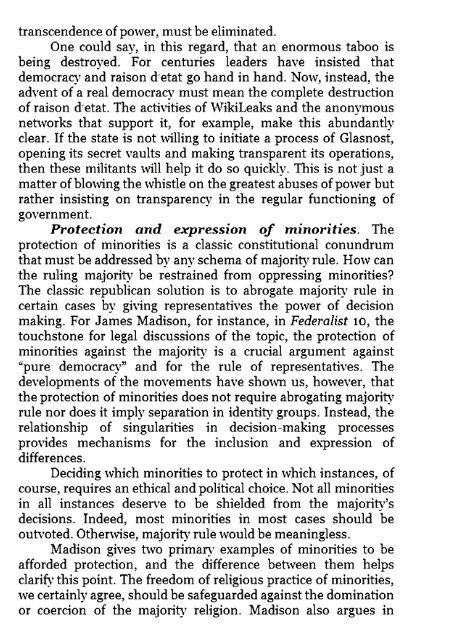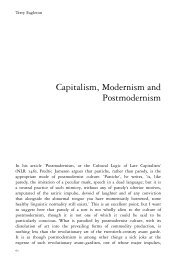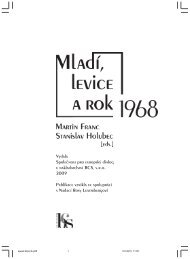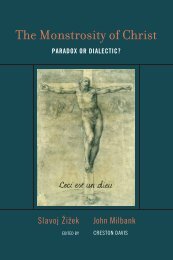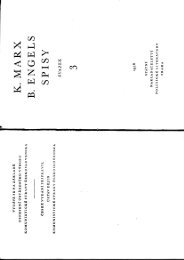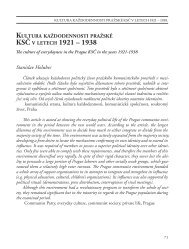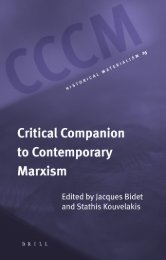Chapter 1: Subjective Figures of the Crisis ... - Negri in English
Chapter 1: Subjective Figures of the Crisis ... - Negri in English
Chapter 1: Subjective Figures of the Crisis ... - Negri in English
You also want an ePaper? Increase the reach of your titles
YUMPU automatically turns print PDFs into web optimized ePapers that Google loves.
transcendence <strong>of</strong> power, must be elim<strong>in</strong>ated.<br />
One could say, <strong>in</strong> this regard, that an enormous taboo is<br />
be<strong>in</strong>g destroyed. For centuries leaders have <strong>in</strong>sisted that<br />
democracy and raison d'etat go hand <strong>in</strong> hand. Now, <strong>in</strong>stead, <strong>the</strong><br />
advent <strong>of</strong> a real democracy must mean <strong>the</strong> complete destruction<br />
<strong>of</strong> raison d'etat. The activities <strong>of</strong> WikiLeaks and <strong>the</strong> anonymous<br />
networks that support it, for example, make this abundantly<br />
clear. If <strong>the</strong> state is not will<strong>in</strong>g to <strong>in</strong>itiate a process <strong>of</strong> Glasnost,<br />
open<strong>in</strong>g its secret vaults and mak<strong>in</strong>g transparent its operations,<br />
<strong>the</strong>n <strong>the</strong>se militants will help it do so quickly. This is not just a<br />
matter <strong>of</strong> blow<strong>in</strong>g <strong>the</strong> whistle on <strong>the</strong> greatest abuses <strong>of</strong> power but<br />
ra<strong>the</strong>r <strong>in</strong>sist<strong>in</strong>g on transparency <strong>in</strong> <strong>the</strong> regular function<strong>in</strong>g <strong>of</strong><br />
government.<br />
Protection and expression <strong>of</strong> m<strong>in</strong>orities. The<br />
protection <strong>of</strong> m<strong>in</strong>orities is a classic constitutional conundrum<br />
that must be addressed by any schema <strong>of</strong> majority rule. How can<br />
<strong>the</strong> rul<strong>in</strong>g majority be restra<strong>in</strong>ed from oppress<strong>in</strong>g m<strong>in</strong>orities<br />
The classic republican solution is to abrogate majority rule <strong>in</strong><br />
certa<strong>in</strong> cases by giv<strong>in</strong>g representatives <strong>the</strong> power <strong>of</strong> decision<br />
mak<strong>in</strong>g. For James Madison, for <strong>in</strong>stance, <strong>in</strong> Federalist 10, <strong>the</strong><br />
touchstone for legal discussions <strong>of</strong> <strong>the</strong> topic, <strong>the</strong> protection <strong>of</strong><br />
m<strong>in</strong>orities aga<strong>in</strong>st <strong>the</strong> majority is a crucial argument aga<strong>in</strong>st<br />
"pure democracy" and for <strong>the</strong> rule <strong>of</strong> representatives. The<br />
developments <strong>of</strong> <strong>the</strong> movements have shown us, however, that<br />
<strong>the</strong> protection <strong>of</strong> m<strong>in</strong>orities does not require abrogat<strong>in</strong>g majority<br />
rule nor does it imply separation <strong>in</strong> identity groups. Instead, <strong>the</strong><br />
relationship <strong>of</strong> s<strong>in</strong>gularities <strong>in</strong> decision-mak<strong>in</strong>g processes<br />
provides mechanisms for <strong>the</strong> <strong>in</strong>clusion and expression <strong>of</strong><br />
differences.<br />
Decid<strong>in</strong>g which m<strong>in</strong>orities to protect <strong>in</strong> which <strong>in</strong>stances, <strong>of</strong><br />
course, requires an ethical and political choice. Not all m<strong>in</strong>orities<br />
<strong>in</strong> all <strong>in</strong>stances deserve to be shielded from <strong>the</strong> majority's<br />
decisions. Indeed, most m<strong>in</strong>orities <strong>in</strong> most cases should be<br />
outvoted. O<strong>the</strong>rwise, majority rule would be mean<strong>in</strong>gless.<br />
Madison gives two primary' examples <strong>of</strong> m<strong>in</strong>orities to be<br />
afforded protection, and <strong>the</strong> difference between <strong>the</strong>m helps<br />
clarify this po<strong>in</strong>t. The freedom <strong>of</strong> religious practice <strong>of</strong> m<strong>in</strong>orities,<br />
we certa<strong>in</strong>ly agree, should be safeguarded aga<strong>in</strong>st <strong>the</strong> dom<strong>in</strong>ation<br />
or coercion <strong>of</strong> <strong>the</strong> majority religion. Madison also argues <strong>in</strong>


